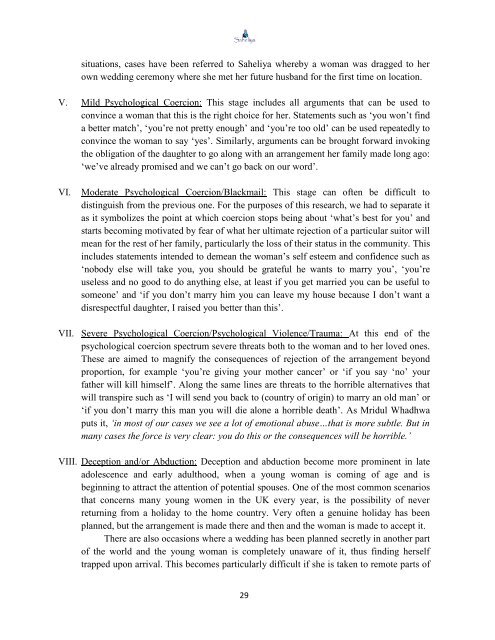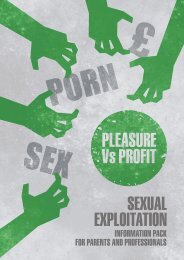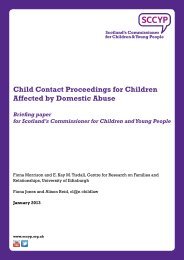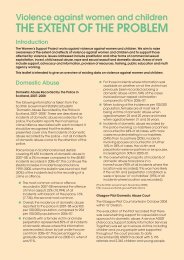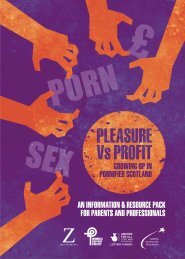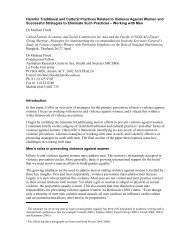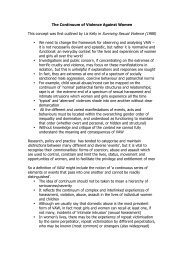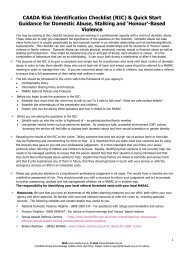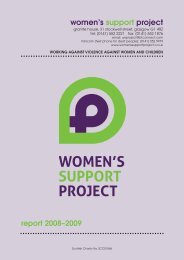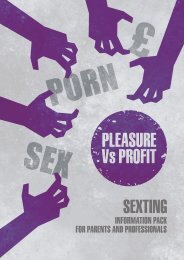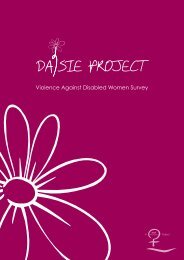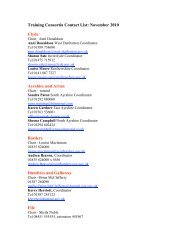WOMEN AND FORCED MARRIAGE IN SCOTLAND
women and forced marriage in scotland - Women's Support Project
women and forced marriage in scotland - Women's Support Project
- No tags were found...
Create successful ePaper yourself
Turn your PDF publications into a flip-book with our unique Google optimized e-Paper software.
situations, cases have been referred to Saheliya whereby a woman was dragged to her<br />
own wedding ceremony where she met her future husband for the first time on location.<br />
V. Mild Psychological Coercion: This stage includes all arguments that can be used to<br />
convince a woman that this is the right choice for her. Statements such as ‘you won’t find<br />
a better match’, ‘you’re not pretty enough’ and ‘you’re too old’ can be used repeatedly to<br />
convince the woman to say ‘yes’. Similarly, arguments can be brought forward invoking<br />
the obligation of the daughter to go along with an arrangement her family made long ago:<br />
‘we’ve already promised and we can’t go back on our word’.<br />
VI.<br />
Moderate Psychological Coercion/Blackmail: This stage can often be difficult to<br />
distinguish from the previous one. For the purposes of this research, we had to separate it<br />
as it symbolizes the point at which coercion stops being about ‘what’s best for you’ and<br />
starts becoming motivated by fear of what her ultimate rejection of a particular suitor will<br />
mean for the rest of her family, particularly the loss of their status in the community. This<br />
includes statements intended to demean the woman’s self esteem and confidence such as<br />
‘nobody else will take you, you should be grateful he wants to marry you’, ‘you’re<br />
useless and no good to do anything else, at least if you get married you can be useful to<br />
someone’ and ‘if you don’t marry him you can leave my house because I don’t want a<br />
disrespectful daughter, I raised you better than this’.<br />
VII. Severe Psychological Coercion/Psychological Violence/Trauma: At this end of the<br />
psychological coercion spectrum severe threats both to the woman and to her loved ones.<br />
These are aimed to magnify the consequences of rejection of the arrangement beyond<br />
proportion, for example ‘you’re giving your mother cancer’ or ‘if you say ‘no’ your<br />
father will kill himself’. Along the same lines are threats to the horrible alternatives that<br />
will transpire such as ‘I will send you back to (country of origin) to marry an old man’ or<br />
‘if you don’t marry this man you will die alone a horrible death’. As Mridul Whadhwa<br />
puts it, ‘in most of our cases we see a lot of emotional abuse…that is more subtle. But in<br />
many cases the force is very clear: you do this or the consequences will be horrible.’<br />
VIII. Deception and/or Abduction: Deception and abduction become more prominent in late<br />
adolescence and early adulthood, when a young woman is coming of age and is<br />
beginning to attract the attention of potential spouses. One of the most common scenarios<br />
that concerns many young women in the UK every year, is the possibility of never<br />
returning from a holiday to the home country. Very often a genuine holiday has been<br />
planned, but the arrangement is made there and then and the woman is made to accept it.<br />
There are also occasions where a wedding has been planned secretly in another part<br />
of the world and the young woman is completely unaware of it, thus finding herself<br />
trapped upon arrival. This becomes particularly difficult if she is taken to remote parts of<br />
29


